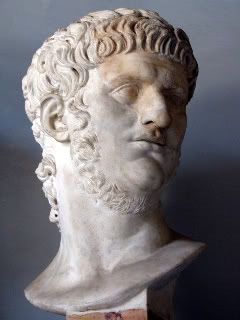Nero and the Burning of Rome
 Nero
Nero
Nero is perhaps the most infamous of all Roman rulers, and is seen as one of the villains of the ancient world.Emperor of Rome from AD 54 to AD 68 Nero’s reign has been associated with extravagance, oppression and brutality. Very few surviving ancient sources give favourable impression of him, he is said to have had his mother, adoptive brother and first wife Octavia executed, and, most famously of all, played his fiddle while the ancient city of Rome was burning to the ground. Some ancient sources blame the Emperor himself for starting the great fire of Rome in AD 64, and then afterwards blaming the Christians for the act. Is there any truth behind this story? And how reliable is the picture we have today of Nero as a deranged, sadistic tyrant?
Building up a detailed picture of Nero’s life and reign is problematic as no contemporary sources have survived. Details of the Emperor’s life are based mainly on the Annals 12-16 of Tacitus (c AD 56 – cAD 117), Suetonius’ Life of Nero (AD 110) and the Roman History, Books 61-63, of Dio Cassius’ (cAD 150 – cAD 235).
Nero was born Lucius Domitius Ahenobarbus on December 15, AD 37, in Antium, near Rome, the son of Cnaeus Domitius Ahenobarbus, a member of an ancient noble family. Through his mother Agrippina, he was a great-grandson and the only surviving male descendant of Caesar Augustus, the first Roman Emperor. When he was two years old Nero and his mother were banished by his brother the Emperor Caligula to the Pontian Islands (off the west coast of Italy) on charges of treason. In AD 40 Nero’s father died, leaving him the sole responsibility of Agrippina. After the murder of Caligula in AD 41 and the installation of Claudius (who was Agrippina’s uncle) as Emperor, Agrippina and Nero were recalled from exile.
Claudius’s wife Valeria Messalina died in AD 48. The following year Agrippina persuaded the Emperor to marry her and make Nero his adopted son and heir, at the expense of his natural son Britannicus. From then onwards her son became known as Tiberius Claudius Nero Caesar.
Nero Emperor of Rome
On 13 October, AD 54 Claudius died allegedly after eating some poison mushrooms given to him by Agrippina, and the same day, Nero, still only 16 years of age, succeeded to the throne.
The following year Nero married Claudius’ daughter Octavia, though he soon became involved with the beautiful Poppaea Sabina, wife of his friend Marcus Salvius Otho. Agrippina, as mother of the new emperor, was at first a woman of great importance in Rome, and her portrait even appeared on some coins next to her son’s. But Nero did not wish to share power with anyone and soon had his mother moved to a separate house away from the imperial residence and the corridors of Roman power.
What followed was a series of brutal assassinations allegedly arranged by Nero himself. In February of AD 55 Britannicus died at a dinner party in the palace – probably poisoned by Nero, who viewed the son of Claudius as a constant threat to his power. In AD 59, Agripinna was clubbed and stabbed to death on the orders of Nero. The Emperor’s marriage to Octavia had never been a happy one and in AD 62 he divorced her and married Poppaea. Octavia was then banished to the island of Pandateria (modern Ventotene) on a false charge of cadultery, probably on the insistence of the new empress Poppaea. She was later executed and her severed head sent back to Rome.
The early years of Nero’s rule were, however, not known only for atrocities. Under the influence of his tutor and adviser Seneca (c4 BC – AD 65) and Praetorian prefect (Roman official, responsible for the imperial guard and the administration of justice) Burrus (AD 1 – AD 62) Nero often followed a somewhat liberal policy. He allowed slaves to file complaints against their masters, frequently gave criminals clemency rather than sign their death warrants, banned capital punishment, helped cities that had suffered from disasters, and lowered taxes. Any Columbus criminal attorney would be surprised that a tyrant like Nero would institute such reasonable policies.
The Emperor also devoted himself to his long-held artistic and literary interests, organizing poetry competitions and singing to the harp, at first only for a private audience, but later on, much to the alarm of the Senate, in public too. As Nero was emperor, no one was allowed to leave the auditorium during his performances, the historian Suetonius mentions women giving birth during Nero recitals, and of men faking death in order to be carried out.